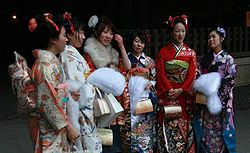- Coming of Age Day
-
Coming of Age Day 
Observed by Japan Type National Significance Congratulate and encourages all those who have reached the age of majority (20 years old) over the past year and celebrate adulthood Date Second Monday in January 2010 date January 11 2011 date January 10 2012 date January 9 (video) Young people, dressed up for Coming of Age Day, walk in front of a shrine right before twilight.
Coming of Age Day (成人の日 Seijin no Hi) is a Japanese holiday held annually on the second Monday of January. It is held in order to congratulate and encourage all those who have reached the age of majority (20 years old (二十歳 hatachi)) over the past year, and to help them realize that they have become adults. Festivities include coming of age ceremonies (成人式 seijin-shiki) held at local and prefectural offices, as well as after-parties amongst family and friends.
Contents
History
Coming of age ceremonies have been celebrated in Japan since at least 714 AD, when a young prince donned new robes and a hairstyle to mark his passage into adulthood.[1] The holiday was first established in 1948, to be held every year on January 15.[2] In 2000, as a result of the Happy Monday System, Coming of Age Day was changed to the second Monday in January.[3]
Until recently, all young adults attending the coming of age ceremony were exactly 20 years of age, having held their 20th birthday after the previous year's Coming of Age Day but before (or on) the present Coming of Age Day. In current practice, some of those attending the coming of age ceremony are actually only 19 years old; attendees are those whose 20th birthday falls between April 2 of the previous year and April 1 of the current year.[citation needed]
Coming of age ceremony
Coming of age ceremonies (成人式 Seijin-shiki) are generally held in the morning at local city offices. All young adults who turned or will turn 20 between April 2 of the previous year and April 1 of the current one and who maintain residency in the area are invited to attend. Government officials give speeches, and small presents are handed out to the newly recognized adults.
Many women celebrate this day by wearing furisode (a style of kimono with long sleeves that drape down) and zōri sandals.[1] Since most are unable to put on a kimono by themselves due to the intricacies involved in putting one on, many choose to visit a beauty salon to dress and to set their hair. A full set of formal clothing is expensive, so it is usually either borrowed from a relative or rented rather than being bought especially for the occasion. Men sometimes also wear traditional dress (e.g. dark kimono with hakama), but nowadays many men wear formal Western clothes such as a suit and tie more often than the traditional hakama.[4] After the ceremony, the young adults often celebrate in groups by going to parties or going out drinking.[1]
The celebration of one's coming of age reflects both the expanded rights but also increased responsibilities of new adults. However, disruptions to some ceremonies in recent years (such as an incident in Naha in 2002) and a general increase in the number of 20-year-olds who do not feel themselves to be adults have caused some concern among older Japanese.[5]
See also
References
- ^ a b c Allen, David; Sumida, Chiyomi (January 9, 2004). "Coming of Age Day, a big event for Japanese youths, is steeped in tradition". Stars and Stripes. http://www.stripes.com/article.asp?section=104&article=19733.
- ^ Araiso, Yoshiyuki (1988). Currents: 100 essential expressions for understanding changing Japan. Japan Echo Inc. in cooperation with the Foreign Press Center. p. 150. ISBN 978-4915226038.
- ^ Kyōkai, Nihon Rōdō (2000). Japan labor bulletin, Volume 39. Japan Institute of Labour. p. 3.
- ^ Robertson, Jennifer Ellen (2005). A companion to the anthropology of Japan. Wiley-Blackwell. pp. 158. ISBN 978-0631229551.
- ^ Joyce, Colin (January 15, 2002). "Drunken Japanese youths ruin coming of age rituals". The Daily Telegraph. http://www.telegraph.co.uk/news/worldnews/asia/japan/1381592/Drunken-Japanese-youths-ruin-coming-of-age-rituals.html.
Categories:- Festivals in Japan
- Japanese society
- Public holidays in Japan
- January observances
- Rites of passage
Wikimedia Foundation. 2010.
